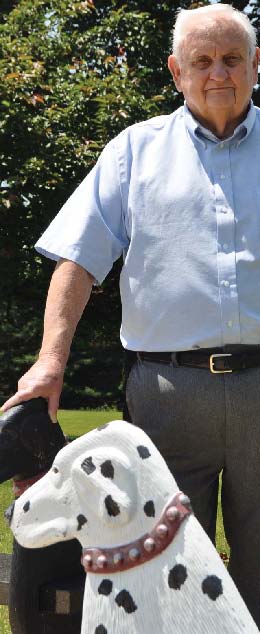International dog disease expert eliminated ailments across species and the world
 “I started at James Baker’s lab under a challenge,” said Leland ‘Skip’ Carmichael, PhD ’56. “I came in his office looking for graduate work. He told me I had six months to figure out how a dog’s immune system responds to canine hepatitis, or I was out.”
“I started at James Baker’s lab under a challenge,” said Leland ‘Skip’ Carmichael, PhD ’56. “I came in his office looking for graduate work. He told me I had six months to figure out how a dog’s immune system responds to canine hepatitis, or I was out.”
Fortunately for dogs across the world, Carmichael passed the test. Over the 40 years he spent at Baker Institute he became one of the world’s best-known international authorities on canine infectious diseases. He has characterized, developed tests and treatment plans for, and invented vaccines against most major canine infectious and reproductive diseases, including distemper, hepatitis, canine parvovirus-2, canine herpesvirus, and canine brucellosis.
“We were at a time when diseases were being recognized and their causes clarified,” said Carmichael. “We focused on research that could directly benefit animals, and always saw our problems in the field.”
From the field to the lab, Carmichael exercised an aptitude for innovation in eradicating disease. “Baker Institute was one of the first labs to use tissue culture methods to isolate viruses, look for vaccines, develop serological tests, and measure immune responses,” said Carmichael. “When a mysterious disease began causing widespread abortions in dogs across the nation, I was charged with figuring out why. By air delivery at midnight I received a paint can that contained aborted fetuses and placental tissue. I went straight to the lab and inoculated plates with tissue samples. The next morning the plates had bloomed with bacteria I’d never seen before.”
Carmichael had found a new species of Brucella, bacteria causing a devastating venereal disease best known for killing farm animals and harming humans who consume infected raw milk.
“Brucellosis is one of the most important veterinary diseases. We were the first to recognize the canine strain and establish control. We offered a free testing service, and fielded over 10,000 phone calls in the first year. Now Cornell’s Animal Health and Diagnostic Center runs the most reliably accurate Brucellosis test I know. The disease has all but disappeared in dogs.”
Today, canine infectious diseases are much rarer than when Carmichael first stepped into Baker’s office, in part because of the work he and his colleagues at Baker Institute have done. Meanwhile, his educational legacy continues. Carmichael’s former graduate student Collin Parish now directs Baker Institute.
“Dogs are part of the human experience,” said Carmichael, “but we’ve seen a nation-wide diminution of canine research in recent years. Most funding comes from institutions that favor research modeling human disease. Baker believed that veterinary research should focus on diseases of animals, I was fortunate to work in a time when that goal garnered strong support. I hope this institute will continue conducting research that can help dogs in the future.”
~
‘Scopes Magazine
July 2011